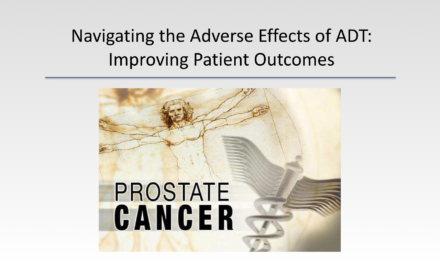Christopher J. Kane, MD, FACS presented “Point-Counterpoint: Active Surveillance for Intermediate-Risk Disease – Con” during the 30th Annual Perspectives in Urology: Point-Counterpoint, on March 10, 2023, at Humphreys Half Moon Inn, San Diego, California.
How to cite: Kane, Christopher J. “Point-Counterpoint: Active Surveillance for Intermediate-Risk Disease – Con.” March 10, 2023. Accessed Nov 2025. https://grandroundsinurology.com/point-counterpoint-active-surveillance-for-intermediate-risk-disease-con/
Point-Counterpoint: Active Surveillance for Intermediate-Risk Disease – Con – Summary
Christopher J. Kane, MD, FACS, discusses active surveillance (AS) for intermediate-risk prostate cancer, sharing National Comprehensive Cancer Network (NCCN) Guidelines and defining favorable intermediate-risk disease. Dr. Kane shares the entry criteria for AS and then data from large randomized trials on treated vs. untreated patients that show more patients with intermediate-risk prostate cancer will die on AS as compared with radical prostatectomy, looking at data over a 20-year time horizon.
He then shares similar results from Prostate Intervention Versus Observation Trial (PIVOT) and ProtecT as well as data indicating that 50 percent of intermediate-risk patients on AS will end up with treatment within five years. Dr. Kane emphasizes that while the point of AS is to avoid overtreatment, for many intermediate-risk patients who begin with AS, treatment does occur but it occurs too late and they do not have the optimal outcomes that earlier treatment would allow.
Dr. Kane turns to progression and treatment rates for AS patients and points out that prostate-specific antigen (PSA) density is a key predictor of treatment. He shares his take-home points, including that favorable intermediate-risk prostate cancer patients are candidates for AS with comparable outcomes to low-risk disease on limited studies with short follow up. However, these patients are more likely to undergo treatment, even without reclassification/progression. He advises practitioners to consider other important clinical and pathologic factors such as percent pattern four, the presence of cribiform patterns, and PSA density and the number of cores.
In conclusion, he asserts that in younger, favorable intermediate-risk patients, AS is not a sound management strategy in the hopes of avoiding treatment.
This lecture is part of a Point-Counterpoint debate. Its opposing lecture is “Point-Counterpoint: Active Surveillance for Intermediate-Risk Disease–Pro.”
About the 30th Annual Perspectives in Urology: Point Counterpoint conference: Presented by Program Chair and Grand Rounds in Urology Editor-in-Chief E. David Crawford, MD, this conference brought together leading experts in urology, medical oncology, and radiation oncology to discuss and debate the latest topics in genitourinary cancers, primarily prostate cancer and bladder cancer. This interactive conference offered topical lectures, pro/con debates, interesting-case presentations, interactive panel discussions, and interactive audience and faculty networking.
ABOUT THE AUTHOR
Christopher J. Kane, MD, FACS, serves as theSenior Assistant Vice Chancellor of Clinical Affairs, CEO of University of California, San Diego Health Physician Group, and a Professor of Urology at the University of California, San Diego. Dr. Kane specializes in diagnosing and treating prostate, kidney, bladder, and testicular cancer. He has extensive expertise in robotic prostatectomy, open and laparoscopic kidney cancer surgery, and bladder and testicular cancer surgery. He also provides care for conditions including benign prostatic hyperplasia or enlarged prostate, elevated prostate-specific antigen levels, and the presence of blood in urine.





